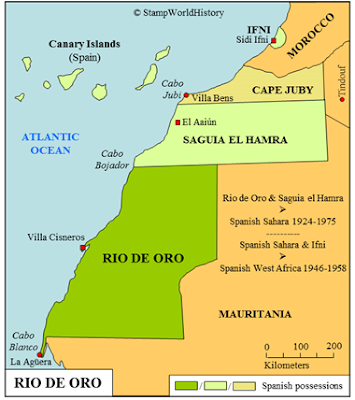What once was a Spanish colony, Rio de Oro (River of
Gold), is now designated as Western Sahara on most maps, although who exactly
governs the area is in dispute. Spain quit in 1974. Morocco claims authority,
but the United Nations says the matter is unresolved. What is certain – there
are no rivers and very little gold in the territory. Parts of it gets foggy
once in a while, though. And there are wadi, stony dry river bottoms that
flowed full in pre-Jurassic times.
In the mid-1400s
Portuguese traders dubbed the area Rio do Ouro because the locals paid gold
dust for European wares. The “river” is a misidentified saltwater inlet from
the Atlantic Ocean. The Spanish kept the name, ever hopeful that riches would
be found somewhere in the desert. Today, artisanal gold mining (small scale,
informal, risky, and likely illegal) thrives in the area.
Legends of forgotten gold hordes stirred the
imaginations of early explorers and their royal sponsors. Endless rumors about
gold rivers in unknown lands and lost cities prompted many great explorations.
Gold does not corrode – an ideal scarce material to accumulate. It validates
power and symbolizes immortality. It’s decorative. But, otherwise, it’s rather
useless.
Warren Buffett claimed that the most valuable
substance on earth is not gold, but a fleck of original gum on a rare postage
stamp. He should know. He was a teenage stamp dealer.
The Oracle of Omaha, I suppose, would not recommend checking Big Blue’s Rio de Oro section for that rare fleck. The RdO stamps in our albums, usually mint, have ample gum; used examples are rarer, there being few people living in in the area.
Census: 24 in BB spaces, 35 on the supplement page
An early Big Blue user! Buffett
collected stamps in a Scott’s International album during the 1940s.
(1) Credit: Gerben van Gelder,
https://stampworldhistory.com/country-profiles-2/africa/rio-de-oro/
(2) Credit Linn’s Stamp News, Aug 11, 2019: https://www.linns.com/news/us-stamps-postal-history/warren-buffett-enjoys-aps-stampshow-in-his-hometown











Nice collection of RIO DE ORO and interesting information .
ReplyDeleteThanks for the encouragement.
ReplyDeleteSpain missed an opportunity to flood the early 20th century philatelic market with an endless variety of Saguia el-Hamra stamps (all depicting the King).
ReplyDeleteAn oversight on Spain's part, possibly, but given the scarcity of these stamps today there must have been very few people buying them back then. And they may have thought the market was too weak to support another batch of King depictions.
DeleteBud, I finally completed Rio de Oro in my '47 BB. Anytime one can complete any of the Spanish Colonies is a victory! Thanks for the post! Ray-- 91% on my BB and climbing....
ReplyDeletecongrats!
ReplyDelete